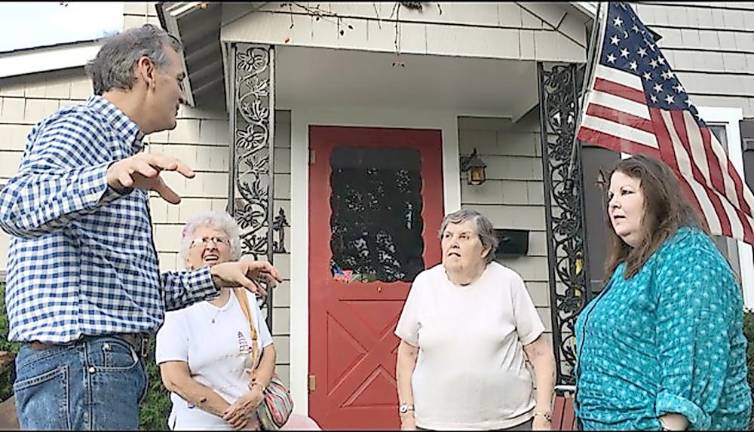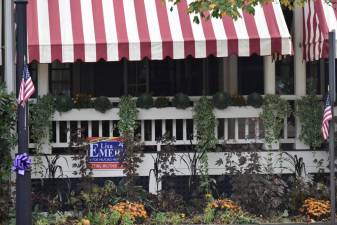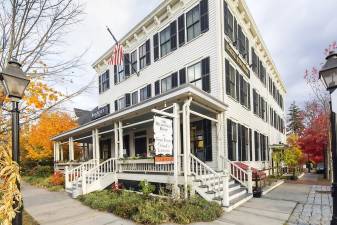‘Prioritize civil discourse, avoid name-calling’: A post-election conversation with Mayor Sean Strub
Milford. Mayor Strub says he reached out to his opponent, Lisa Emery, to convene a group with faith and civic leaders to heal divisions in the borough.

The Courier reached out to Sean Strub after he won re-election as Milford mayor to hear his thoughts on transcending the polarization and hostility that dogged the political season, and his short- and long-term plans for the borough.
Q. Congratulations on your successful campaign. How did you feel leading up to the election, and how do you feel now?
A. I was uncertain of the outcome. Some days I felt confident, other days less so. But I knew that my campaign team and volunteers and I had done everything we could, so I was prepared to be at peace no matter the outcome.
Q. Has Lisa Emery, your opponent, reached out to you, or you to her?
A. Yes, I reached out to Lisa and asked if she was interested in getting together with some faith and civic leaders later this year to discuss how we can reduce the polarization in the community. She responded graciously and agreed to participate. Probably sometime between Thanksgiving and Christmas, we will try to convene a group of folks to discuss what can be done.
Q. What can you do to ameliorate the hatred and nastiness we saw in this race?
A. Most of it, but not all, was from people outside of Milford Borough who were pursuing other agendas through this race. I think there are things we can do as a community, which is why I’ve been reaching out to find folks who want to explore those avenues. I have ideas myself, but I think any sort of plan or effort needs to come out of a group process.
Q. Do you have ideas for uniting the two sides of the community — for making the other side feel they are being listened to and have a stake in Milford?
A. Yes, but a lot of it is what I’ve always tried to do, which is to bring new people into engagement with our local government and civic life, prioritize civil discourse, avoid name-calling and nastiness, and focus on endeavors that transcend partisan polarization.
Q. How did Javier (Strub’s husband) feel about your running for a second term?
A. Javier is extremely supportive of me, but it wouldn’t have broken his heart if I didn’t run for reelection or hadn’t won. There is stress and, sometimes, nastiness that crosses a line and is a cause for concern for family.
Q. Many of your supporters spontaneously decided to boycott all the properties owned by Bill Rosado, particularly the Hotel Fauchère, which you recently sold to him (see related article). Do you think this will continue now that the election is over? Do you support the boycott? Some people have said, “It feels like crossing a picket line to go to the Fauchère.”
A. I’ve never supported any boycott of any local business, despite those who repeatedly claim otherwise. I addressed this specifically in my remarks on election night. It is important for those of us who live in Milford that our commercial district be vital and our businesses succeed. We have had major investments in the renovation of several properties, including the theater, that are great for Milford residents.
Q. What will replace the Fauchère as a gathering place for the Strub “inner circle.” Will you still go to the Fauchère? Is there another place for these like-minded people to gather?
A. Yes, of course I still go to the Hotel Fauchère. But now that I no longer have the day-to-day responsibility of running the restaurants or hotel I can actually go out and enjoy some other places as well (every restaurant owner reading this understands what I mean). I had a great dinner at the Waterwheel on Friday evening, and it was such a joy to be at someone else’s restaurant on a Friday!
Q. You have presented many different events at the Fauchère, such as a Native American dinner, a talk by author Suzanne Levine, and the post-opera party. Where will you hold these now?
A. I hope the Hotel Fauchère and other venues in Milford will be receptive when similar opportunities arise. But having my own venue was convenient, for sure.
Q. What are your plans for Milford, both short and long term?
A. In terms of serving as mayor, it is to continue the work I started five years ago, improving and modernizing our police department, bringing greater transparency to local government, engaging new residents in local organizations, supporting and helping to market our commercial district, continuing work with the Lenape tribes, and doing what I can to help secure grant funding for infrastructure improvements. I also have my work with the Milford Enhancement Committee, Greater Pike Community Foundation and the Milford Readers and Writers Festival — on whose boards I serve — as well as my real estate projects.
Q. What do you want your legacy to be?
A. I want to work hard for Milford and let history define my “legacy.” I do think about what Milford will be like 50 or 100 years from now and want to make sure what I am doing today is contributing to a vision of our community’s future.

